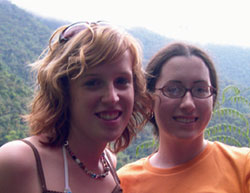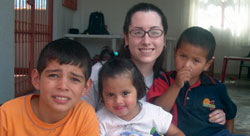Tired of changing the Channel
Volunteering in Costa Rica was a chance to experience another culture and try to make a difference in people's lives
By Katie O'Connell
March/April 2007
Return to Table of Contents
Print Article
When we turn on the television we often see commercials for various organizations that aid the world's most impoverished people. Many of us, instead of watching these commercials, immediately change the channel because we find the images disturbing and depressing. I believe that much of the Western world has become comfortable with ignoring the problems associated with poverty, instead of finding long-term solutions to them. Our society has become self-centered, so absorbed with our own lives and worries that we cannot see the bigger picture.
 Chealsea and Katie in Costa Rica
Chealsea and Katie in Costa Rica
Tired of changing the channel, I wanted to do something that made a difference; to leave my protective bubble and become more aware of what was going on in the world, specifically in terms of children.
So my close friend Chelsea Mason and I decided to experience another culture firsthand by volunteering abroad in Cartago, Costa Rica. We chose to go with an award winning non-profit organization called Cross Cultural Solutions based in New York City and in London, England.
Both of us would have liked to stay longer than the two-week program, however as university students, we needed to get back for summer employment.
The first few days in Costa Rica were an adjustment and we did experience culture shock. Suddenly we were foreigners in a country where we did not speak the language and everything was unfamiliar. We had to get used to not being able to drink the tap water and to putting the toilet paper in a bin rather than flushing it down the toilet.
However, Costa Ricans are a friendly people and they made our transition easier. When we walked through the streets of Cartago during our free time, many people said hello and offered a big smile. They were also very patient when we attempted to speak to them in Spanish and would correct us politely or attempt English to put us at ease. Unlike our society they are much more laid back, often arriving 10 or 15 minutes late for things and affectionately referring to this as "tico" (Costa Rican) time.
Our home base and all the homes in the neighbourhood had metal gates that were locked at all times to protect what little the people had. On the outskirts of the city lived the poorest, mostly single mothers and their children, in homes made of nothing more than scrap metal and various other materials.
We learned from local people that Costa Ricans are a family and faith oriented society. It is common for grandparents to live with their children and grandchildren. They are considered a vital part of the family, often caring for their grandchildren and preparing meals while the parents are working.
Most Costa Ricans are Roman Catholic. The Basilica de Nuestra Senora de Los Angeles (Our Lady of the Angels) in Cartago is a special place. Mass was being celebrated when we visited and there were so many people that they spilled out the doors.
An annual pilgrimage occurs the night of August 1 and well into the early hours of the next day. Worshippers from as far away as Nicaragua fill the road from San Jose on their way to celebrate the 1635 appearance of La Negrita, patroness of Costa Rica. At a spring behind the Basilica, people fill bottles with water believed to have curative properties. Miraculous healings are attributed to the Virgin Mary.
Children in transition
While Chelsea worked in a daycare, I worked at a "Pani" or transition home where children were placed if their home situation was abusive or violent. In this government-funded facility, children could stay for up to six months before going back home, going to live with relatives, or going to an orphanage.
Four women worked there and were referred to as "Tia" (Aunt). They fed, washed and clothed the children and made sure they attended school regularly. While I was at the home, up to 30 children were there, ranging from two to 15 years of age. The older teenage girls helped to prepare meals, but with so many children to care for there was no time to give each child individual attention.
There were certain rules that we were expected to follow while working there. The most difficult rule was no hugging or cuddling of the children. The Aunts did not want the children to get attached to the volunteers because eventually we would be leaving.
Most of my time was spent playing with the children. The younger children's playroom had a cement floor and was bare except for a couple of tables and some chairs. The older children were permitted to play outside in a large field, but the tall grass and weeds made it difficult for them to run about. I attempted to play soccer with some of the boys and kept tripping over the long weeds, but we still managed to have a lot of fun.
 Katie O'Connell at the Pano with (L-R) Jonathan, Lily and Andre.
Katie O'Connell at the Pano with (L-R) Jonathan, Lily and Andre.
Despite the emotional or physical suffering these children had experienced in their lives, they greeted us with huge smiles each morning and could not wait to colour, skip rope or play cards with us. They waited for us by the front door and would immediately try looking in our bags for goodies. Each time I pulled out the pencil crayons their eyes lit up. They were so proud of their drawings, hiding them under their mattresses and sometimes giving them to the volunteers as gifts.
My favorite memory is of playing skipping rope. I would stand outside most of the morning turning that rope non-stop and the children never grew tired of the game. They would even invite me to skip with them to give me a break from turning. Both the boys and the girls could not wait for their turn and laughed and giggled the whole time they skipped. They taught me to count in Spanish as they counted each jump.
I became particularly attached to the youngest child, Lily. Her timid little smile was a window to her vulnerability and innocence. Cautious towards the volunteers at first, she quickly opened up to us. She loved to collect the pencil crayons and run away with them, giggling. I cherished the few quiet moments when we both took a break from playing and she would sit on my lap, her head leaning against me, and watch the other children play. The Tias were not sure of her real name or her exact age, although they thought she was about two years old. They had given her the name Lilandra when the police brought her to the Pani.
A few days after I started work, three siblings arrived. It was heartbreaking to watch them try to adjust. The youngest fit in well but the eldest had more of a grip on the reality of their situation and spent the first few days silently crying in the corner.
Another difficult rule, one that I did not follow most of the time, was to ignore any crying unless the children were obviously physically hurt. I would try to comfort them whenever I could, even if it was just rubbing their back or gently squeezing their hand, just to let them know that I cared. Then they would give me a little smile and go off to play again.
Poverty is a global issue
More than anything this trip made me even more certain that poverty is a major global issue that can no longer be put on the backburner. As Canadians it is our responsibility to become aware of the world's problems and help in any way we can. It is my belief that unless we step up to the plate and do more, the problems associated with poverty will only increase. My generation especially needs to become more proactive and informed about world issues.
After my experience in Costa Rica I certainly want to become more involved and do more, especially with respect to children. They are innocent, vulnerable and have the right to play, to go to school, to have medical care and, most importantly, to be loved.
Katie O'Connell is studying Biology at the University of New Brunswick. After graduating in May, she plans to continue on into Secondary Education. Katie is a cousin of Scarboro missioner Fr. John Carten.
Return to Table of Contents
Print Article